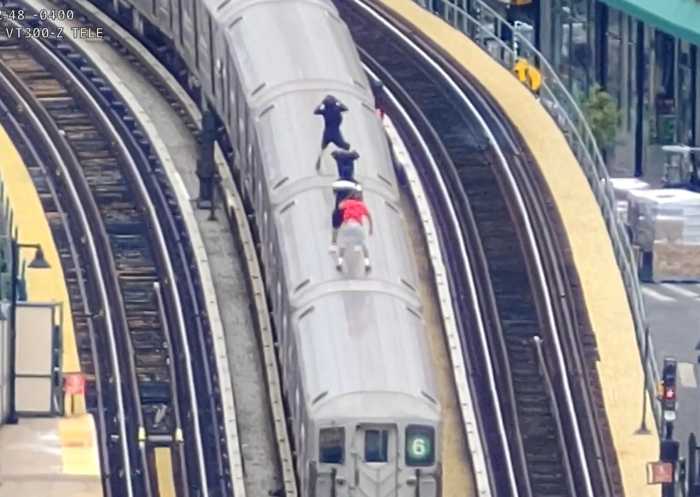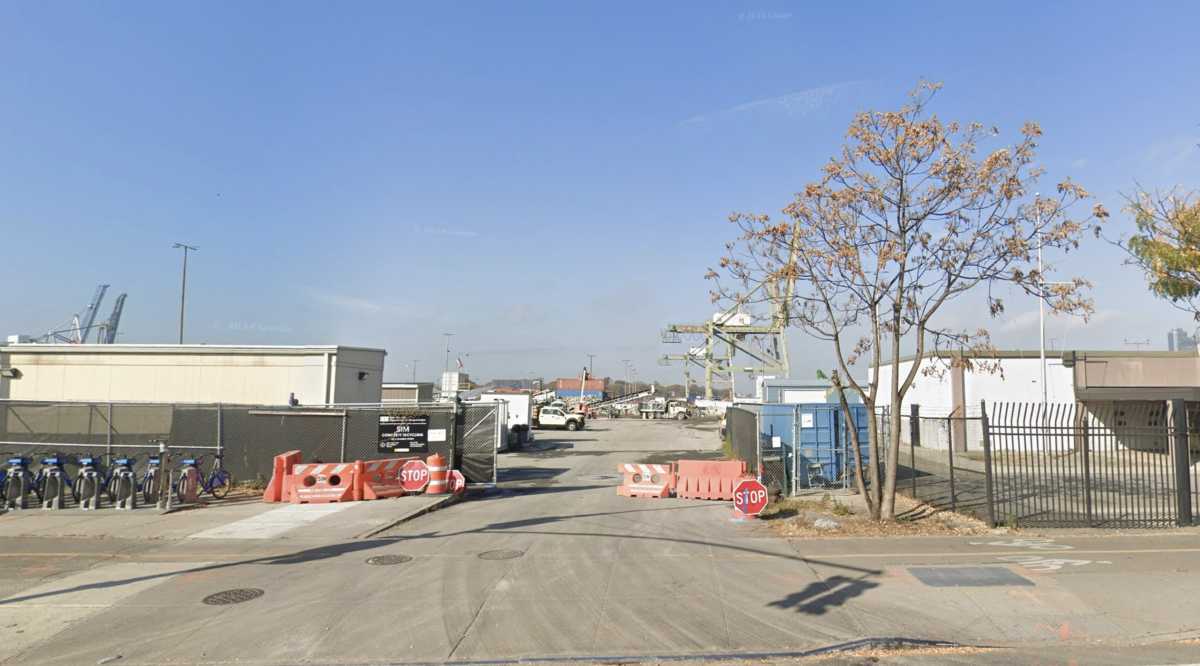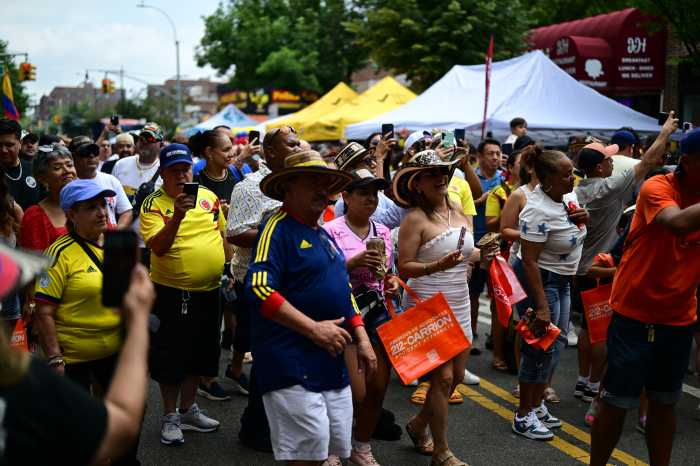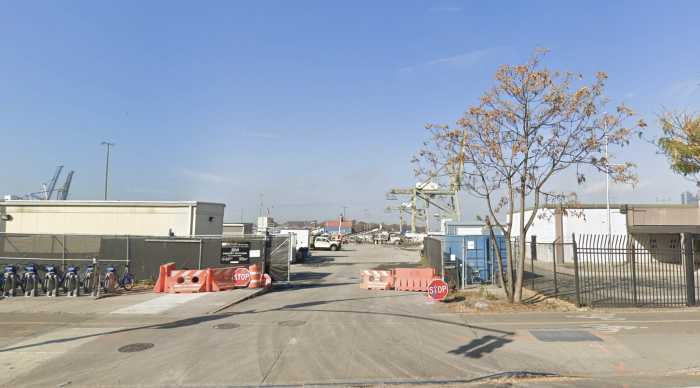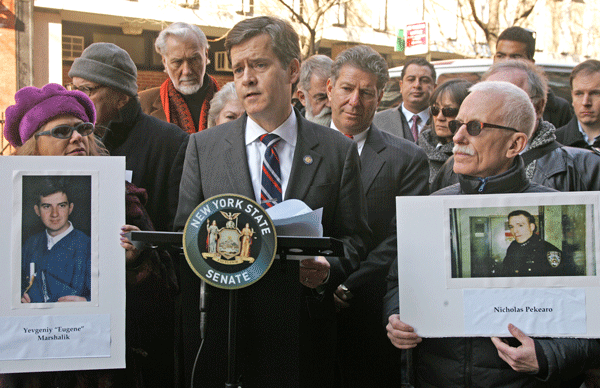
BY SAM SPOKONY | On the seventh anniversary of the fatal shooting of two young auxiliary police officers on a South Village street, state Senator Brad Hoylman introduced legislation that would make the penalty for killing an auxiliary officer the same as that for killing a regular New York Police Department officer.
Nicholas Pekearo, 28, and Yevgeniy “Eugene” Marshalik, 19, were killed on March 14, 2007, while pursuing a crazed gunman who had just slain a pizza restaurant worker on W. Houston St. and was then fleeing on foot while firing wildly. Since the city’s auxiliary officers are unarmed, the two men were defenseless when the gunman, David Garvin, turned and shot them dead near the corner of Sullivan and Bleecker Sts. Garvin was killed minutes later in a shootout with N.Y.P.D. officers who’d rushed to the scene.
The deaths of Pekearo and Marshalik led to a landmark change in safety protocols for auxiliary police officers, who are all unpaid volunteers. Days after the tragic incident, former Mayor Mike Bloomberg and former Police Commissioner Ray Kelly asked the City Council to set aside money, for the first time, to provide funding to issue bulletproof vests to all auxiliaries. Before that, auxiliaries had to purchase their own protective vests.
However, from a legal standpoint, another key aspect of the fatal shooting went largely unnoticed for years. If Garvin had survived the incident and stood trial for killing Pekearo and Marshalik, he would not have been charged under New York State’s first-degree murder or manslaughter laws that apply to the killing of a police officer. Instead, the shooting of the auxiliary officers would have been treated the same as the shooting of a civilian.
“But auxiliary police officers deserve the same protections as police and peace officers, and their assailants should face the same penalties,” said Hoylman at a March 14 press conference outside the Sixth Precinct, on W. 10th St. “It’s crucial that we recognize these civic-minded individuals and the sacrifices they make, as well as the families who have suffered, and who are concerned about their well-being each day they’re out in the line of duty.”
Hoylman’s new bill, the Auxiliary Police Officers Yevgeniy Marshalik and Nicholas Pekearo Memorial Act, would finally bring the legal penalty for killing an auxiliary officer in line with the penalty for killing a regular officer.
“It’s a matter of justice, it’s a matter of fairness and it’s a matter of respect for Officers Marshalik and Pekearo,” Hoylman added.
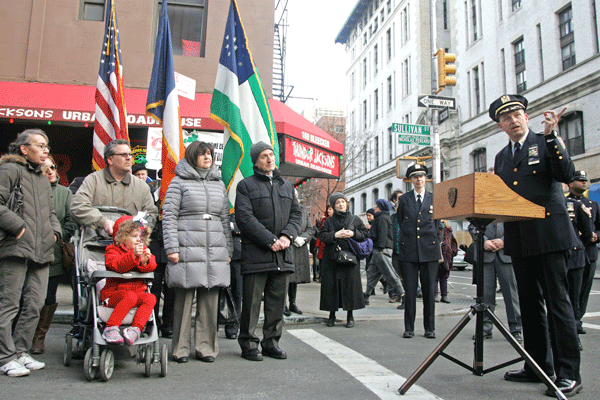
Jeff Schlanger, chief of staff for Manhattan District Attorney Cy Vance, said at the press conference that the new legislation is “long overdue,” and will correct an “oversight” in the criminal justice system.
“We believe it does the right thing,” said Schlanger. “It helps to further protect those who protect us, and that’s vitally important.”
The New York Police Department’s Auxiliary Police Program includes more than 4,500 volunteer officers — more than any such program in the nation — who assist their local precincts by performing uniformed patrols. Although auxiliary officers are trained to observe and report crimes rather than directly engage with criminals, the nature of their work often places them in dangerous situations.
Later on March 14, the families of Pekearo and Marshalik joined both Sixth Precinct officers and auxiliaries in an annual memorial ceremony at the corner of Bleecker and Sullivan Sts., which were co-named after the fallen men in 2009.
“I stand here with sadness and with pride,” said Inspector Elisa Cokkinos, who commands the Sixth Precinct, in remarks at the ceremony.
“Sadness because we all know they were much too young and full of humanity to be taken so soon from their families and society. And pride because these two young men were out there on that tragic night, protecting our neighborhood, when they didn’t have to be.”
Deputy Inspector Phylis Byrne, commanding officer of the auxiliary police program, explained that, seven years later, the sacrifice of the two men — and the circumstances that led to their deaths — still remains at the forefront of the program.
“I donʼt make a decision about this program without thinking about Nick and Eugene first; they affect everything I do in this job,” she said. “And aside from the fact that, after they were killed, the program changed to provide more protections, another thing happened after that. People started to understand the job they and other auxiliary officers actually do for this city.”
After the commanders’ remarks, community members and the families of the slain men once again recalled the great talents and personalities of Pekearo and Marshalik, which were blossoming just as their lives were brutally cut short.
Marshalik was a New York Univesity student who had immigrated from Russia at age 5, and had previously become a top debater at Stuyvesant High School despite not being a native English speaker.
Pekearo, a lifelong Villager, was an accomplished author who had already written three novels, one of which — “The Wolfman,” published posthumously in 2008 — is now being adapted into a feature film.
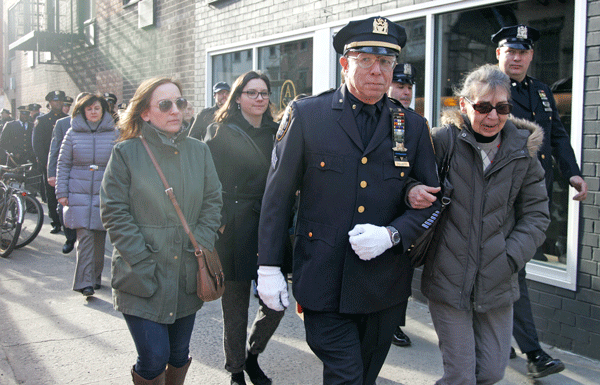
Pekearo’s mother, Iola Latman, who still lives on Morton St., just blocks away from the murder site, mentioned the prospect of the film adaptation while talking about her son’s legacy following the ceremony.
“He had such a bright future as a writer, but he was also just such a good human being,” Latman told The Villager. She added that the annual memorials for her son and Marshalik affect her and her family more deeply with each passing year.
“We’ve been really shaken up today,” she said.
When asked for her thoughts on Hoylman’s new legislation, Latman said she thought it was another positive way of protecting auxiliary officers, just as the order for bulletproof vests was back in 2007.
“Yes, I think it’s a good thing,” she said of the new bill.



